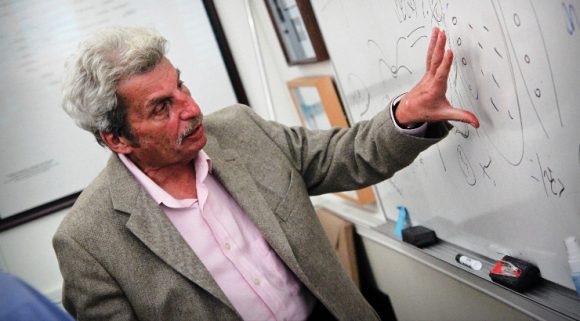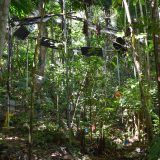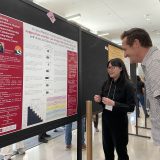June Research Highlights IQS' Aharonov inducted into Royal Society
June 27, 2024
Yakir Aharanov, the James J. Farley Professor in Natural Philosophy, has been elected a fellow of the Royal Society. The elected fellows, recognized for their invaluable contributions to science, are leaders in their fields and come from all parts of the world. Other elected Royal Society fellows include Isaac Newton, Charles Darwin, Benjamin Franklin, Dorothy Hodgkin and Stephen Hawking. Aharonov, co-director of Chapman’s Institute for Quantum Studies (IQS), is renowned for his contributions to the co-discovery of the Aharonov-Bohm Effect, a quantum-mechanical phenomenon in which an electrically charged particle is affected by an electromagnetic potential. Read more about Aharonov’s lifetime achievement in the OC Register.

Yakir Aharonov, co-director of the Institute for Quantum Studies, will be formally inducted into the Royal Society in July.
Douglas Fudge, professor of biological sciences, is no stranger to hagfish. For the past 20 years, Fudge has studied these bottom-dwelling marine animals capable of producing startling amounts of defensive slime when provoked. He and his team recently described how hagfish behave and move within sediments in a new paper published in Journal of Experimental Biology. To do so, the scientists created a specialized tank of transparent gelatin. They discovered that hagfish create a u-shaped burrow by utilizing a ‘thrash’ phase with vigorous swimming coupled with side- to-side head movements, followed by a ‘wriggle’ phase that continues until the head of the hagfish pops up out of the substrate. Read more about this in news coverage from Ars Technica.
Faculty in the college have also authored a number of new studies:
Lindsay Waldrop, assistant professor of biological sciences, is the senior author of a paper entitled “Mixed uncertainty analysis on pumping by peristaltic hearts using Dempster-Shafer theory.” Published in the Journal of Mathematical Biology, the study develops statistical approaches for understanding how to quantify the multiple areas of uncertainty in computational models of biological phenomena.
Uyen Phan, assistant professor of food science, is the first author of a paper entitled, “Socioeconomic constraints on low-income individuals’ perceptions toward food safety.” Published in the Journal of Sensory Studies, the study found that individuals from lower socioeconomic backgrounds in Vietnam were more likely to select foods containing unsafe chemicals.
Nishank Raisinghani, Mohammed Alshahrani, and Grace Gupta, students in the Computational Analysis and Data Sciences program, have collaborated with professor of biochemistry Gennady Verkhivker to publish a paper entitled “Exploring conformational landscapes and binding mechanisms of convergent evolution for the SARS-CoV-2 spike Omicron variant complexes with the ACE2 receptor using AlphaFold2-based structural ensembles and molecular dynamics simulations.” Published in the Journal of Physical Chemistry Chemical Physics, the study looks at how different subvariants of the Omicron variant of SARS-CoV-2 have co-evolved similar spike protein complexes.


